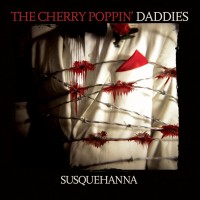To answer your first question, yes -- the Cherry Poppin' Daddies are still around. Additionally, they've just released a new album, and no, it's NOT swing. No, they haven't "abandoned their roots"; the Daddies were never a "swing band" to begin with. Believe it or not, they've released four studio albums (and one all-swing compilation) since their inception in 1988, all filled to the brim with rock, funk, swing, ska, jazz and punk, with a bit of country, glam rock, disco and grunge thrown in for good measure. Now freed from the major label shackles of the short-lived and much-reviled swing revival that pigeonholed them into double-platinum superstardom, they've returned with Susquehanna.
In a very admirable move, the Daddies haven't degraded themselves to giving in and catering towards their "swing band" image; they've retained the same multi-genre concept album approach as seen on their previous work. Every single track is composed in an entirely different genre (this time with a predominantly Latin vibe), with all its songs united under the same lyrical theme: Each track is a narrative where the song's characters reflect on times of their lives, both good and bad. That being said, Susquehanna is obviously not an easily accessible album to the average listener; how much eclecticism you can handle is the determining factor in whether you find the album fresh and varied or jumbled and inconsistent.
However, it's the most musically simplistic songs that make up Susquehanna's standout tracks. In what may be the band's finest song, "Hi and Lo" finds the Daddies trying their hand at ska-punk á la the Mighty Mighty Bosstones, skipping along at a pleasant upstroke-heavy speed before arriving at a breathtakingly epic chorus to rival "The Impression That I Get"; with powerful guitars and a fantastic hornline, lead singer Steve Perry strongly, earnestly yelps "I've been high / but mostly low / A lifelong lodger on a dead-end road / But I like mine / to shine like gold / The darkest hour turned brighter than a rose." This is ska-punk at its absolute finest, a product of quality songwriting and musicianship, and a song that is possibly better than Reel Big Fish's entire repertoire; ska fans burnt out on the superficially sunny and wacky vibe that the genre's adopted since its mainstream explosion would be hard-pressed to argue.
Meanwhile, "White Trash Toodle-oo" is perhaps the most inventive thing ever done with neo-swing. The song bristles along with standard retro swing rhythm (with not-so-standard lyrics regarding a family with an abusive father and suicidal wife), before lunging aggressively into a full-on punk rock chorus. There's even time for a peppy trumpet solo at the bridge! Here, the Daddies have realized swing's true contemporary potential via the introduction of punk rock (much like the Bosstones did with ska music), presenting the musical evolution the swing revival desperately needed in its heyday. They may have arrived a bit late, of course, but they've done more than Brian Setzer could ever hope to do with swing.
The rest of the album is speckled with high points. Ska resurfaces in the form of "Hammerblow," a killer third wave tune, and "Blood Orange Sun," whose lyrics and vocals save it from its bland, Sublime-style reggae. Standard swing returns in the superb "Wingtips," whose moving lyrics are partially obscured by the overuse of the word "diaper" in the chorus. "Bust Out" is a Latin-flavored rock tune that works excellently as a dance number but not quite as the single the band wants it to be (the Spanish-language translation, "Arrancate," closes out the album). "The Mongoose and the Snake" successfully swings with swanky, hair-greasing rockabilly, while "Tom the Lion" swings with breezy, hip-shaking calypso. "Julie Grave" is a rockin' throwback to the `70s, whose sing-along "na na na na" bridge is ripe for Bic-flicking. The album's closer, "The Good Things," neatly ties everything together, musically and lyrically, in a surprisingly effective mellow rock fashion.
Susquehanna proves challenging at points. What furthers the album's inaccessibility is the band's approach to the more exotic genres; on "Breathe," while they nail the sound of bossa nova to a tee, the band doesn't add an ounce of their personal uniqueness, making it just "a bossa nova song" rather than a "Cherry Poppin' Daddies song" that would easily connect with the rest of the albumâs sound. Likewise, it's hard to get into a traditional flamenco tune right after a straightforward rock song. While these tracks may work for some, the average rock or ska listener will find themselves frequently skipping them.
If you're looking for another dose of watered-down novelty swing, stick with Big Bad Voodoo Daddy. The Daddies' melange of styles is an acquired taste (as is Steve Perry's nasally voice); however, if you're willing to take the time to listen to something different that fits into that rare category of style AND substance, you can do no wrong with Susquehanna, the newest release from perhaps the most misunderstood and underappreciated band of the 1990s.
